Just as constructing buildings involves more than just laying bricks, managing a construction business encompasses more than just physical structures; it’s equally about constructing and maintaining client relationships. In this context, CRM for construction companies plays a pivotal role.
Much like a robust foundation is critical for the stability of a building, a CRM system ensures consistent and positive client engagement, which is the cornerstone of a successful construction enterprise.
In the construction industry, relationships are fundamental. Clients often entrust expensive, high-profile projects to firms they know and trust. CRM for construction companies becomes an invaluable tool here, as every interaction with a client through this system can either fortify or weaken that trust.
Therefore, it is crucial for client-facing employees to have a comprehensive understanding of the following:
- Who is the customer?
- Who is employed by the client?
- What previous initiatives have they completed with the client?
- What projects have they completed that are comparable to those they want to achieve?
- They have successfully pursued opportunities with the client (client strike rate).
- How frequently and what does their firm communicate with the client?
And much more!
Construction-centric customer relationship management (CRM) can eliminate this issue by making accurate, up-to-date, and actionable relationships easily accessible. In this blog, we’ll delve deeper into the multifaceted benefits of CRM for construction companies and how it stands as an essential tool, especially when navigating the unpredictable terrains of today’s construction industry.
What is a CRM for Construction Companies?
In the challenging construction world, where project efficiency and precise management are key, CRM software stands out as a vital tool. Unlike common perception, CRM for construction companies is more than just a platform for managing customer data and tracking relationships.
The Key Aspects of CRM for Construction Companies
Below we explore the key aspects of CRM for construction companies:
- Beyond Basic Customer Management
CRM systems in construction go beyond traditional customer data management. They encompass a broader scope, managing relationships with stakeholders, contractors, and other key players in the industry.
- Enhanced Project Management
CRMs aid in maintaining efficiency and accuracy in project management. They help align projects with initial estimates, reduce deviations, and ensure project scope adherence.
- Streamlining Communication
Effective CRM tools minimize miscommunication risks, a common challenge in construction projects. They ensure seamless integration of various project stages, enhancing overall communication flow.
- Strategic Asset for Financial Planning
CRMs assist in accurate sales forecasting and financial goal setting. This feature is crucial for time and cost savings in an industry with tight margins.
- Comprehensive Functionality
Apart from relationship tracking, CRMs offer functionalities like task streamlining and insightful reporting. This comprehensive approach makes CRM a strategic tool in optimizing construction business operations.
CRM for construction companies is not just about handling customer interactions; it’s a multifaceted tool that plays a central role in managing complex projects, financial planning, and maintaining vital relationships across the industry.
The Benefits of a CRM for Construction Companies
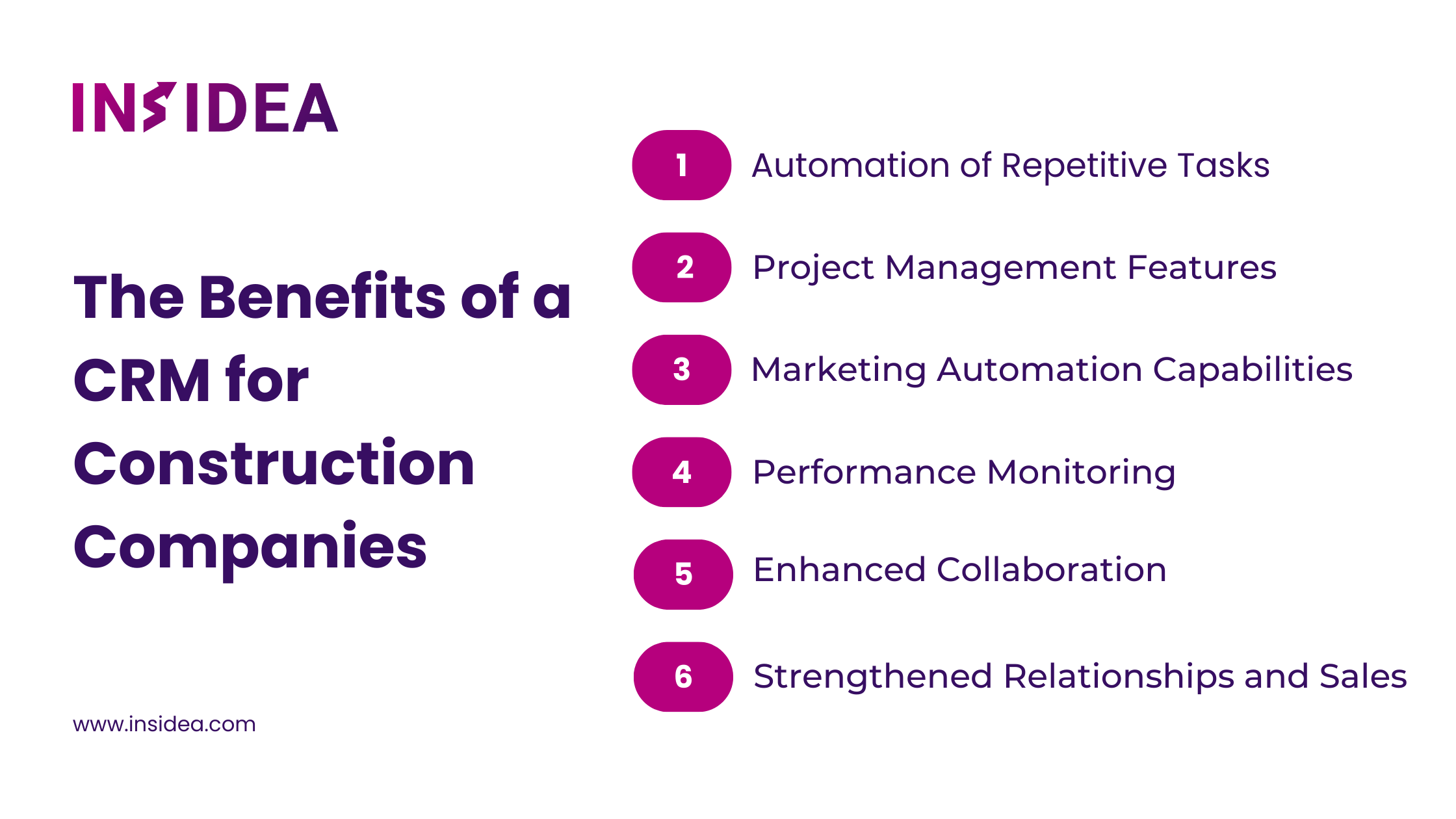
CRM for construction companies is a powerful tool that significantly improves various aspects of the business. Below, we explore some of its benefits for the construction industry:
1. Automation of Repetitive Tasks: It frees up time by handling routine administrative tasks, allowing focus on more crucial aspects of the business. This CRM redirects the sales team’s efforts toward core sales activities. It simplifies scheduling appointments and sending out batch communications, reducing manual work.
2. Project Management Features: Lead and opportunity tracking captures, tracks, and prioritizes potential projects, ensuring everything is noticed; centralized bid information; monitored deadlines;, and maintained open communication channels with clients. It is a hub for all essential project documentation, from blueprints to contracts, enabling tracking of task assignment progress and ensuring timely project completion.
3. Marketing Automation Capabilities: This CRM automates communication sequences, ensuring consistent and timely engagement with potential clients, and facilitating the creation, dispatch, and performance analysis of email campaigns. It allows segmentation for more personalized and effective messaging and offers insights on marketing efforts, optimizing strategy, and resource allocation.
4. Performance Monitoring: A high-level view of various projects facilitates better decision-making, enabling tracking of specific elements like work orders and change requests. It uses aggregated data for better forecasting and performance predictions.
5. Enhanced Collaboration: This CRM reduces task duplication and oversights by centralizing information, streamlining collaboration with partners in related industries, expediting results, centralizing data, and making vital details readily available for quick decision-making. It enhances the ability to oversee and optimize the sales and project pipelines.
6. Strengthened Relationships and Sales: It uses CRM data to personalize communications, enhance the customer experience and centralize data, track leads, automate workflows, and foster team collaboration for an effective sales strategy. It employs sales forecasts and reporting for setting targets and refining strategies.
Adopting CRM in the construction sector doesn’t merely bring about operational efficiency but also reshapes and refines every aspect of the business, from lead acquisition to project completion.
Essential Features of CRM for Construction Companies
Construction companies today face unique challenges in managing client relationships and project workflows. A CRM (Customer Relationship Management) system designed for construction companies can significantly streamline these processes. Here, we explore the key features that make CRM an indispensable tool for construction businesses.
1. Effective Lead Management
CRM provides robust lead management capabilities for construction companies. It enables quick tracking and efficient management of potential leads, facilitating their conversion into loyal customers.
2. Real-Time Pipeline Tracking
A pivotal feature of CRM in construction is pipeline tracking. This allows businesses to view and monitor the status of projects in real-time, ensuring timely decision-making and response to any project changes.
3. Customized Customer Segmentation
CRM systems help segment customers based on specific criteria. This segmentation is key for tailoring customer experiences and services and enhancing client satisfaction.
4. Automation of Key Processes
Automating sales, marketing, and customer service tasks is a significant advantage CRM offers for construction companies. This automation leads to a more streamlined workflow, reducing manual efforts and increasing efficiency.
5. In-Depth Analytics and Reporting
Another crucial aspect is tracking performance and gaining insights into customer behavior. CRM systems provide detailed analytics and reporting, aiding in strategic planning and a better understanding market trends.
6. Targeted Email Marketing
CRM tools assist in creating and dispatching targeted email campaigns. This feature is vital for maintaining communication with clients and enhancing marketing strategies.
7. Social Media Integration
Integrating with social media platforms allows construction companies to connect with clients more interactively. CRM for construction companies enables responding to customer reviews and engaging with clients on various social platforms.
8. Mobile Application Accessibility
The availability of a mobile app means access to client information on any device, adding to the flexibility and responsiveness of the business.
By incorporating these features, CRM for construction companies becomes more than just a software system; it transforms into a strategic tool, enabling firms to build strong client relationships and gain a competitive edge in the market. These functionalities streamline operations and provide valuable insights for business growth and customer satisfaction.
Key Considerations While Purchasing a CRM for Construction Companies
Since CRM is a one-stop solution for all the issues while dealing with clients, but opting for such software, one must keep in mind the following considerations:
- Network Mapping
Prioritize CRMs that recognize the importance of fostering relationships at all organizational levels, ensuring every potential client or partnership is noticed. The ideal CRM should enable mapping clients, prospects, personnel, owners, and other key entities down to the individual level. Seek out CRMs that can recognize a contact across different roles or firms, preserving their detailed history and interactions with your firm.
- Central Database
Avoid fragmented data by ensuring your CRM consolidates all necessary details in one accessible place. A central database allows new team members to understand project histories quickly and decreases their reliance on long-standing employees.
- Industry-Specific Integrations
A construction CRM should integrate smoothly with industry-specific systems, such as financial and project management platforms. Reducing duplicate entries ensures accurate and up-to-date records, which is crucial in the construction industry.
- Proposal and Resume Automation
Opt for CRMs that expedite proposal creation by pulling relevant project data, enabling tailored client pitches. Ensure that your CRM fetches data from verified sources to guarantee the accuracy and credibility of proposals.
- Hit Rate-Improving Analytics
Analyze which projects and partnerships yield the most profits to improve the hit rate. Discern which lead sources, whether conferences or other avenues, bring in the most valuable projects. Identify project types that not only win bids but are also profitable.
- Go/No, Go Functionality
Leverage CRM data to enhance the Go/No process, optimizing resource allocation to high-probability opportunities. The CRM should guide in evaluating project relevance, team alignment, and relationship potential, among other crucial factors.
- Mobile Functionality
Given that many CRM users access platforms across different devices ensure the CRM offers a seamless mobile experience. The ideal CRM will allow field agents to log real-time information, ensuring no missing details. To enhance field operations, look for CRMs offering voice-to-text note entry, automated call logs, and push notifications.
Construction firms can invest in a CRM system that meets their industry-specific needs by focusing on these key areas.
Top 5 CRMs for Construction Companies in 2024
I. HubSpot
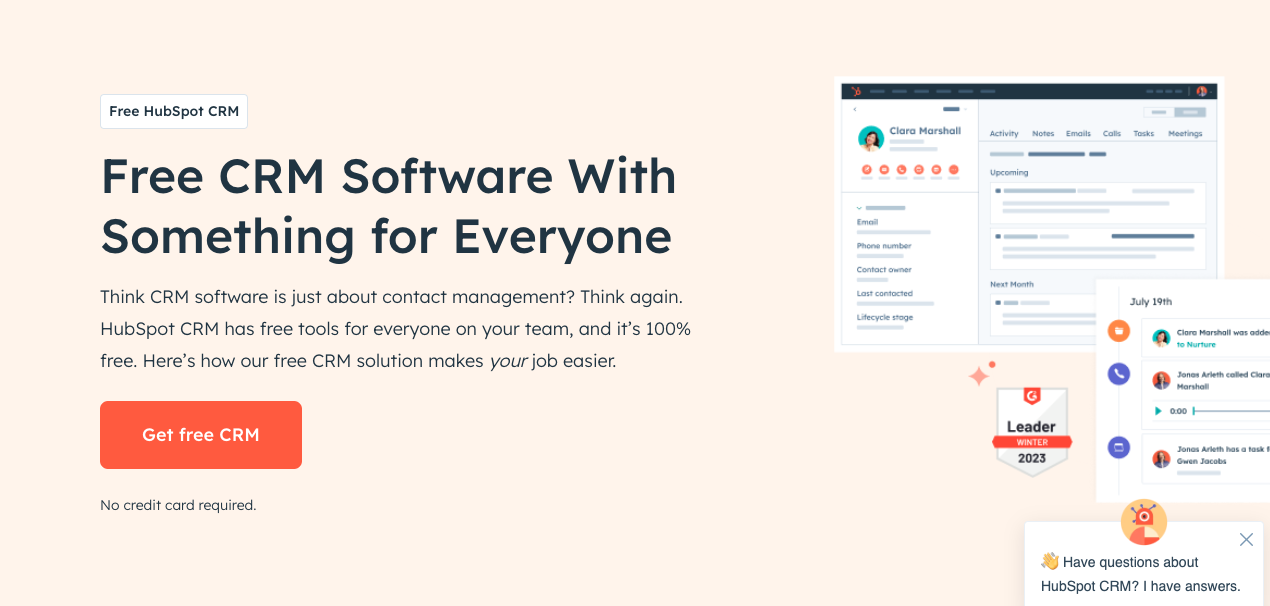
Source: HubSpot
- Intuitive and User-Friendly: HubSpot CRM for construction companies is designed to be easy to navigate, making it an ideal choice for construction companies of various sizes. Its user-friendly interface ensures that even those with minimal technical expertise can use it effectively, facilitating smoother operations and quicker adoption across different levels of the organization.
- Free and Flexible Plans: The platform starts with a free version, making it accessible for businesses of all sizes, especially small to medium construction firms. As a company grows and its needs become more complex, HubSpot offers scalable paid options. This flexibility allows construction companies to expand their CRM capabilities in line with their growth without incurring unnecessary costs at the outset.
- Modular Tools for Growth: HubSpot CRM is modular, offering a range of tools and features that can be added or removed as needed. This modularity is particularly beneficial for construction companies, as it aligns with their evolving requirements. As a business grows, additional features and tools can be integrated, ensuring that the CRM system grows with the company.
- Enhanced for Construction: Recognizing the specific needs of the construction industry, HubSpot has tailored its CRM to be more construction-friendly. This includes improved project management features, which are essential for efficiently handling multiple construction projects. Additionally, the CRM for construction companies offers integrations with popular construction management software, ensuring seamless data flow and improved coordination between different software systems used within the company. This integration is crucial for streamlining operations and enhancing overall project management efficiency.
II. Salesforce
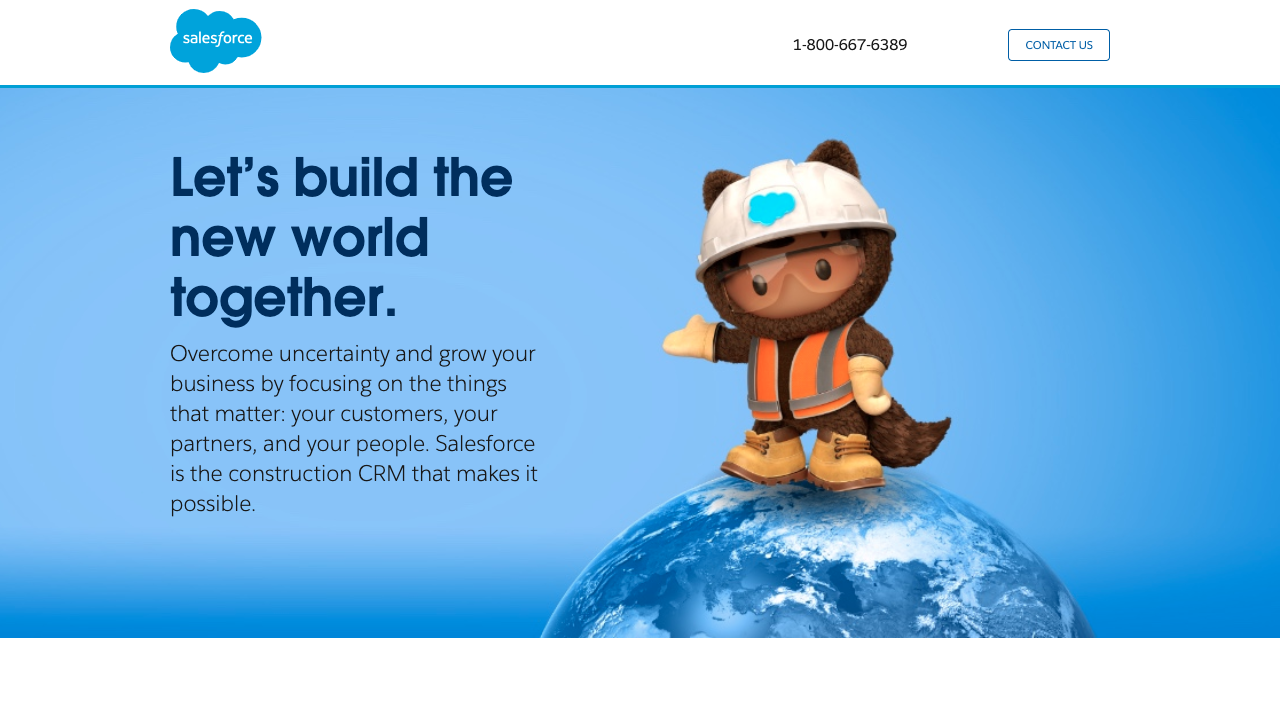
Source: Salesforce
- Customizable: Salesforce stands out as a cloud-based CRM due to its high customizability. It can be tailored to fit the specific needs of a business, making it a versatile tool for construction companies. This adaptability means that the platform can be configured to align with different construction projects’ unique processes and workflows, ensuring a more efficient and streamlined operation.
- Robust Analytics and Reporting: One of Salesforce’s key strengths is its powerful analytics and reporting capabilities. These features provide deep insights into various aspects of business operations, such as sales performance, customer engagement, and project progress. For construction companies, this means tracking and analyzing project data in real-time, aiding in informed decision-making and strategy optimization.
- Advanced Project Management Tools: Salesforce CRM for construction companies offers advanced tools specifically designed for project management, which are ideal for construction companies that handle complex projects. These tools enable detailed oversight of every aspect of a project, from planning and execution to monitoring and completion. Such comprehensive project management capabilities ensure that all project facets are under control and progressing as planned.
- Maintenance Intensive: Along with its cost, Salesforce is also known for being maintenance-intensive. It demands time and resources for its upkeep, including regular updates and management. For construction companies, this means allocating additional resources for CRM maintenance, which might be challenging for smaller firms with limited manpower and technical expertise.
- Benefits for Construction: Salesforce CRM for construction companies is particularly benefits construction companies due to its efficient project management features, excellent document storage capabilities, and API availability. These features allow for seamless integration with other tools and systems, making managing large volumes of project-related documents and data easier.
- Limitations for Small Businesses: Despite its advantages, Salesforce poses certain limitations for small businesses. The lack of a free version and the potential high costs associated with its advanced features and maintenance can be prohibitive for smaller firms with tighter budgets. This aspect makes it less accessible for small-scale construction companies or those just starting.
III. Pipedrive
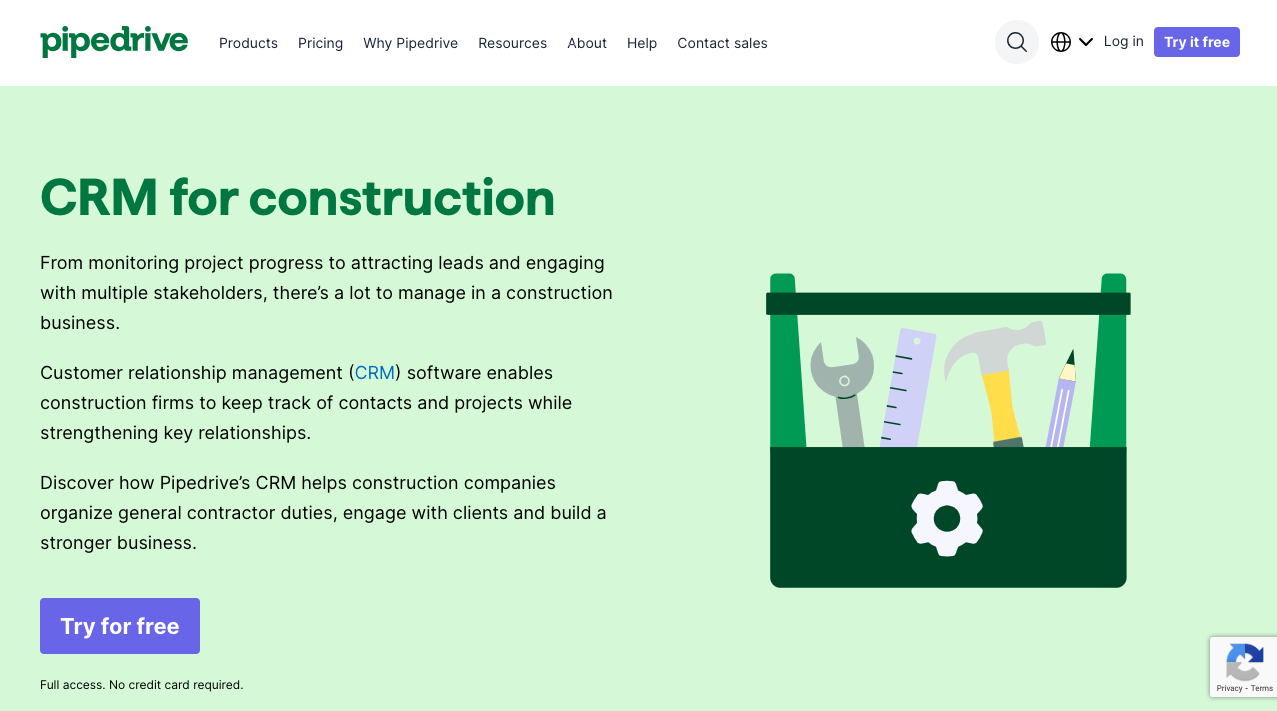
Source: Pipedrive
- Workflow Automation: Pipedrive CRM for construction companies excels in automating workflow, significantly streamlining the sales processes for businesses. This feature is particularly beneficial for construction companies as it automates repetitive tasks, saving time and reducing the likelihood of errors. This automation ensures that sales teams can focus more on client engagement and project negotiations rather than getting bogged down by routine tasks.
- Affordable Plans: The platform is known for its budget-friendly plans, making it an attractive option for small businesses, including those in the construction industry. This affordability is crucial for smaller firms that need robust CRM capabilities without a hefty price tag, allowing them to invest more resources into other areas of their business.
- Customizable Sales Pipelines: Pipedrive provides highly customizable sales pipelines, offering construction companies the flexibility to tailor the sales process according to their specific project cycles and client engagement strategies. This customization is essential in the construction sector, where sales processes can vary significantly depending on the type and scope of the project.
- Simple API Access: The CRM for construction companies offers straightforward API access, enabling easy integration with other tools and software commonly used in the construction industry. This ease of integration is vital for ensuring seamless data flow between different systems, enhancing efficiency and reducing the likelihood of data silos.
- Convenience in Construction: Pipedrive stands out for its ability to simplify multi-channel data management, a highly beneficial feature in construction project management. With construction projects often involving various communication channels and data sources, Pipedrive’s capability to streamline and centralize this information greatly aids in maintaining project oversight and ensuring all team members are on the same page.
IV. Insightly
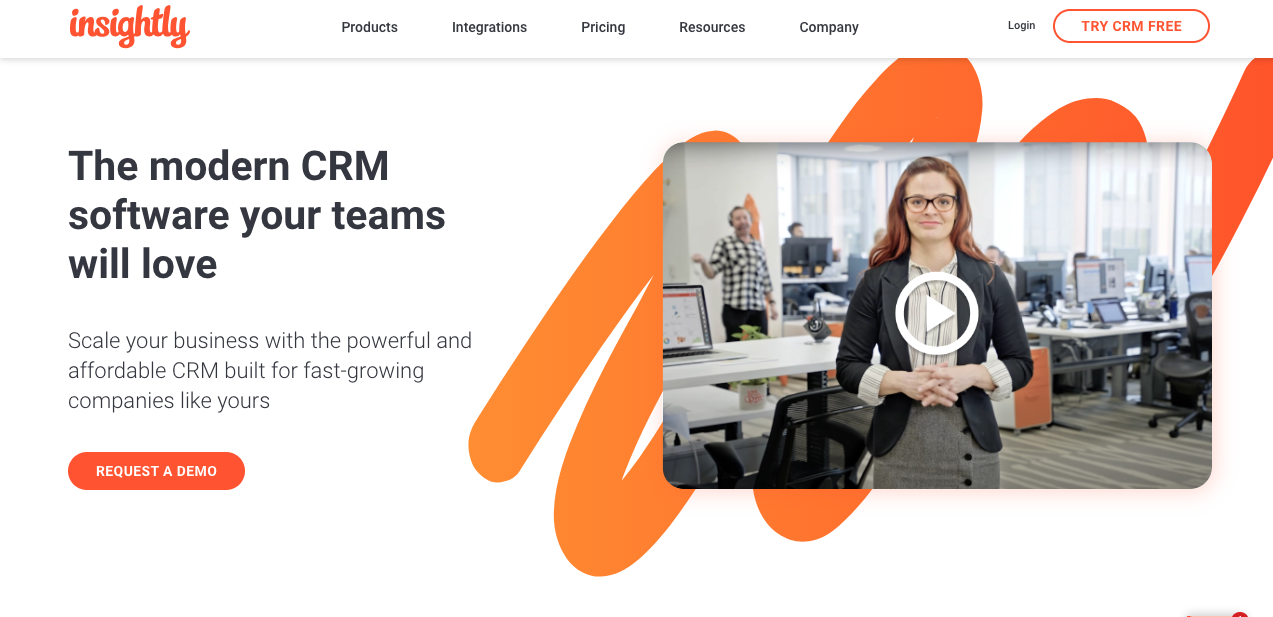
Source: Insightly
- Third-party Integrations: Insightly distinguishes itself in the CRM for construction companies market, particularly for construction contractors, through its excellent third-party integration capabilities. It seamlessly connects with various applications, allowing construction companies to integrate their CRM system with other software tools they already use. This integration is crucial for streamlined operations, ensuring all systems work together harmoniously without data silos.
- Reliable Workflow Automation: The platform is renowned for its reliable workflow automation and efficient management of tasks and emails. For construction contractors, this means less time spent on routine administrative tasks and more on critical project activities. Automating these processes enhances overall productivity and ensures that essential tasks are completed in a timely manner.
- Accessible Anywhere: Insightly offers comprehensive web and mobile support, ensuring that users can access their CRM data anytime. This accessibility is particularly beneficial for construction contractors, often on-site or in the field, allowing them to stay connected and informed about project developments and client interactions without being tied to an office.
- Customizable Dashboard: The CRM provides a customizable dashboard, allowing construction businesses to tailor the user interface to their specific needs. This flexibility ensures the most relevant and crucial information is readily accessible, enhancing efficiency and decision-making processes.
- Construction Focus: One of Insightly’s key strengths is its focus on integrating project management with CRM, a feature particularly crucial for construction contractors. This integration allows for seamless coordination between managing customer relationships and overseeing construction projects, ensuring that all aspects of the business are aligned and efficiently managed. This dual focus makes Insightly a particularly suitable choice for construction firms looking for a comprehensive CRM for construction companies solution.
V. ClickUp
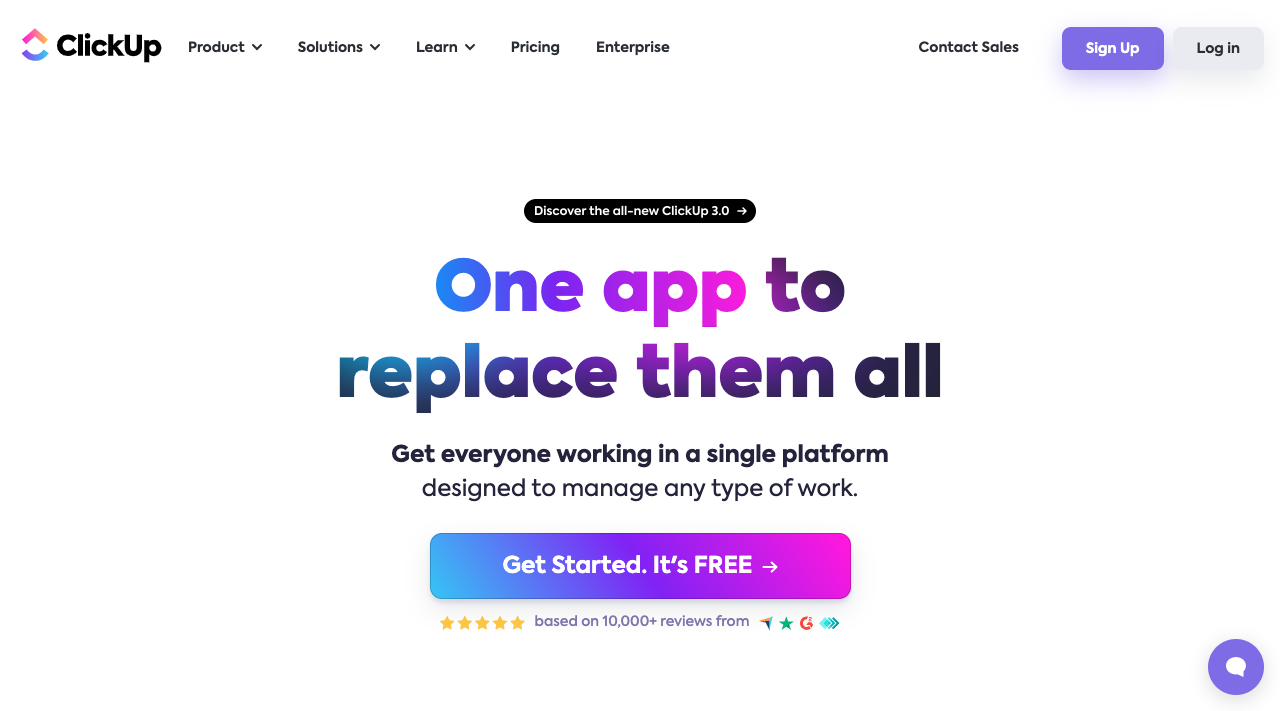
Source:ClickUp
- Precise Scheduling Tools: ClickUp CRM for construction companies provides detailed start dates, due dates, and exact times, enhancing accuracy in scheduling deadlines and milestones for construction projects.
- Enhanced Communication: Offers assigned and threaded comments in documents, tasks, or whiteboards, essential for aligning on marketing roadmaps and project plans in construction.
- Comprehensive Support: Includes a detailed online Help Center, webinars, and support teams to assist users in maximizing the platform’s benefits for construction management.
- Advanced Organization Features: Features like notes, labels, and tags for advanced sorting and filtering, adding context and clarity to every time entry in construction project management.
- Robust Reporting and Dashboards: Provides reporting tools and customizable dashboards for a high-level overview of construction work, aiding in project management and decision-making.
- Extensive Integrations: Over 1,000 integrations available, enabling the consolidation of all relevant data and information into one platform, streamlining construction project management.
Adopting a CRM for construction companies is no longer just a luxury but a strategic necessity, empowering companies to enhance operational efficiency, manage complex projects effectively, and build lasting relationships with clients. As the construction sector continues to evolve, these CRM tools will play a pivotal role in shaping the future of construction businesses, driving growth, and fostering sustainable success.
Unlock Your Business Potential With Expert HubSpot Support!
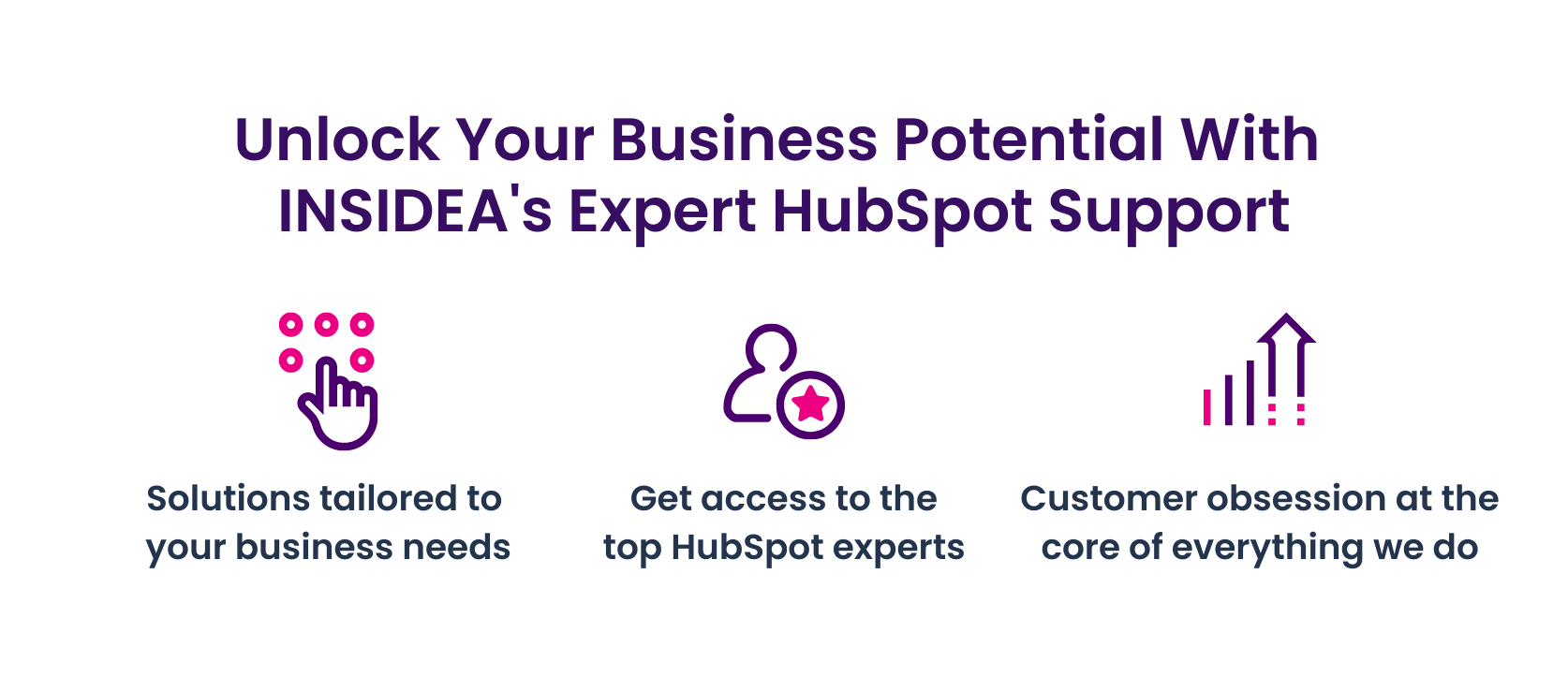
As a HubSpot Solutions Partner we take pride in assisting you with streamlining your HubSpot efforts. With our best-in-class marketing, sales, and service solutions, we help you scale exponentially. INSIDEA’s HubSpot Specialists have the required in-depth knowledge and can provide you with expert guidance on how to use the platform to meet your specific business needs.
Get in touch today to learn more about how INSIDEA can help you succeed!
- Tailored Experience: For us, user experience is the primary focus. Thus, INSIDEA works with you to ensure your HubSpot experience is tailored to your business needs.
- Industry Expertise: Our team specializes in the setup, implementation, and optimization of HubSpot tools, as well as being well-versed in HubSpot best practices to ensure your business has the highest ROI possible.
- Customer Obsession: For us, customer satisfaction is the key to success, and we strive to ensure that our customers’ needs are not only met but exceeded every time.
At INSIDEA, we understand the importance of valuable HubSpot strategies that understand your target audience and drive conversions. Book a meeting with our HubSpot experts to explore how we can help you with your upcoming projects.
Get started now!










































